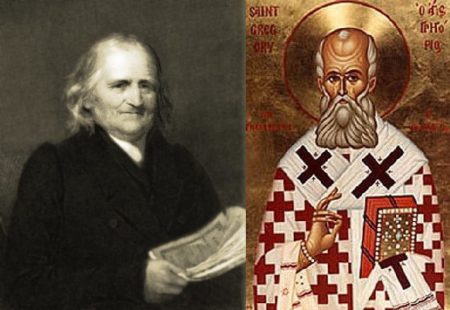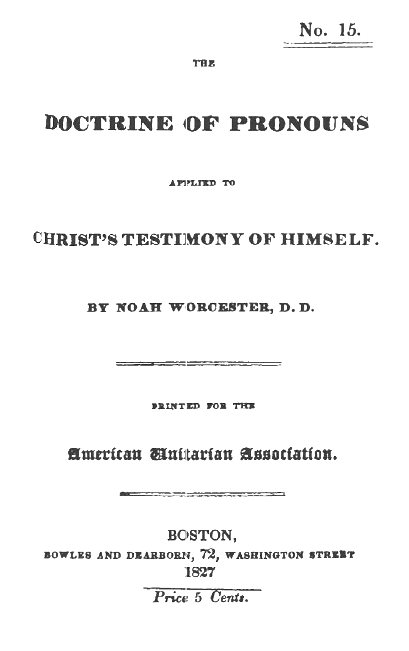Podcast: Play in new window | Download
Subscribe: Spotify | Email | RSS
 Many readers have thought that especially in the fourth gospel, Jesus is presented as God himself, or as “fully divine” or as possessing a “divine nature,” any of which would imply that he is the uncreated creator, all-knowing and all-powerful (and these independently of any other), immune to temptation or death, ultimate in authority, and not in any sense “under” any other, the ultimate source of all other good things.
Many readers have thought that especially in the fourth gospel, Jesus is presented as God himself, or as “fully divine” or as possessing a “divine nature,” any of which would imply that he is the uncreated creator, all-knowing and all-powerful (and these independently of any other), immune to temptation or death, ultimate in authority, and not in any sense “under” any other, the ultimate source of all other good things.
But especially in the gospel according to John, Jesus explicitly says that his authority, teaching, and power come from God, from the God who sent him and who works with him and through him and testifies to him, his God and our God, the Father. Don’t such statements plainly imply that Jesus is not God himself, but that he is someone else, and is dependent on God for his mission, authority, wisdom, and power? And if Jesus were the God of Abraham and Moses, he wouldn’t have any “Father” or any god over him, right? But Jesus in the fourth gospel explicitly claims to have both!
In this episode, you’ll hear contrasting approaches to reading such texts. First, ancient catholic bishop, rhetorician, and polemical theologian St. Gregory of Nazianzus (d. 390) from his famous “theological orations,” given just before what would come to be called the second “ecumenical” church council. In short, he asserts that it is rather obvious that the above subordinationist-sounding texts should be understood as having to do with Jesus’s “human nature” only.
In contrast, early American theologian Noah Worcester (d. 1837) argues that because of the ordinary use of pronouns, we ought to take such claims as having to do with Jesus’s whole person, and that asserting him to be talking (without any hint of it) only of one of his parts (natures) would make Jesus a deceiver. He also notes that the author of this gospel is constantly at pains to correct the reader’s potential misunderstandings of Jesus’s sayings. Why then, if John means to assert that Jesus is God, does he not qualify or explain so many sayings in his gospel which would lead the reader to think that Jesus is a lesser being than God who is dependent on him?
Moreover, what if the shoe were on the other foot? What if Jesus were always presented as asserting his own absolute independence of any other, with no one over him – and the unitarians said that he was only speaking of the power of God within him, and not of his human self, the one in whom that power operated? If such unitarians would merely be evading the obvious force of such texts, why are not trinitarians, in the actual case, merely evading the force of the many clear subordinationist texts?
In this episode you’ll hear the entirety of Worcester’s 1827 tract “The Doctrine of Pronouns Applied to Christ’s Testimony of Himself.” For your listening pleasure, I’ve slightly modernized his language.
 Links for this episode:
Links for this episode:
- St. Gregory of Nazianzus, One God and Christ: The Five Theological Orations and Two Letters to Cledonius, trans. Williams & Wickham
- 16 American Unitarian Tracts
- God and his Son: the logic of the New Testament
- podcast 184 – Where did Jesus say “I am God, worship me”?
- podcast 183 – Challenge Unmet
- podcast 166 – Alvan Lamson’s On the Doctrine of Two Natures in Jesus Christ – Part 2
- podcast 165 – Alvan Lamson’s On the Doctrine of Two Natures in Jesus Christ – Part 1
- podcast 156 – Dr. J.R. Daniel Kirk on A Man Attested by God – Part 2
- podcast 155 – Dr. J.R. Daniel Kirk on A Man Attested by God – Part 1
- podcast 146 – Jesus as an Exemplar of Faith in the New Testament
- podcast 145 – ‘Tis Mystery All: the Immortal dies!
- podcast 124 – a challenge to “Jesus is God” apologists
- podcast 116 – George R. Noyes’s Explanation of Isaiah 9:6 and John 1:1
- podcast 86 – Kermit Zarley on distinguishing Jesus and God
- podcast 70 – The one God and his Son according to John
- podcast 66 – Before Abraham was… what?
- podcast 63 – Thomas Belsham and other scholars on John 8:58
- podcast 62 – Dr. Dustin Smith on the preexistence of Jesus in the gospel of John
- podcast 61 – Dr. Dustin Smith on preexistence in ancient Jewish thought
- podcast 22 – a cure for odium theologicum
- podcast 16 – How is Jesus “the one Lord”?
- podcast 15 – Are Paul’s “one God” and “one Lord” one and the same?
- podcast 14 – One God, One Lord, Two Interpretations
- This week’s thinking music is “Space (Full)” by Andy G. Cohen.

Dr. Dale Tuggy Concerning the doctrine of two natures. There is no clear articulation and/or indication of it in the Christian Greek Scriptures. One does violence to the biblical texts when they import such semi-gnostic concepts. Trinitarian christology reduces the personality of Jesus to a metaphysical abstraction! The two-natures are nothing more than a cop-out to avoid dealing with irrefutable texts. All Gregory of Nazianzus did, was aggrandized christological issues and further subjected himself to irreconcilable notions. What is transparent is that Jesus did not possess divine omniscience. Mark 13:32 was a text that embarrassed many theologians in the patristic era. Honest theology demands that we admit when theories try to circumvent putative contradictions.The solution is to declare that the two-nature theory is untenable.
Keefa,
It would be ideal to avoid impugning the motives of people without grounds to do so. I disagree with a lot of what you said simply because you assume insincere intentions in those who hold the two-nature theory. This isn’t necessary, but usually comes as a package deal when a Trinitarian or Unitarian disagrees with someone on the other side.
“The solution is to declare that the two-nature theory is untenable.”
That’s exactly what Dale does. It is doubtful you listened to the podcast in its entirety or his other blog posts or podcasts.
Greetings Aaron
[you said] It would be ideal to avoid impugning the motives of people without grounds to do so.
[reply] Where did you get the idea that I didn’t have grounds to question to their motives? Do you feel that I don’t have empirical evidence at my disposal? Shall I indict them on charges of not only corrupting the biblical texts, but extracting middle platonic philosophy? What sources do have to counter the arguments that I would be able to delineate? Also I don’t mind having a friendly chat about the patristics ( i.e. Arian controversy) but I have certain requirements that need to be met so that I don’t waste my time. I debate for edification not sport.
with regards
Aaron,
I agree. I think most Trinitarians (and Biblical Unitarians) have sincere intentions and good motives. Even as a Biblical Unitarian myself, I find that many non-Trinitarians also make logical mistakes, commit exegetical fallacies, and fail to adequately articulate their positions (including many of my fellow BUs).
Thus, I dont’ think it’s worthwhile to question motives are act as if pointing out few apparent mishaps or contradictions would make any position seem more tenable.
Rivers 🙂
“Where did you get the idea that I didn’t have grounds to question their motives? Do you feel that I don’t have empirical evidence at my disposal? Shall I indict them on charges of not only corrupting the biblical texts, but extracting middle platonic philosophy”
When assuming sincere motives as a default, I was referring to the everyday Christian Trinitarian one would encounter, not the individual or small group which originated the comma Johanneum, for example. Come on now, that is ridiculous and obviously not what I was talking about. That you have no grounds for generalizing the insincere motives of Trinitarians in general is self-evident. That there is evidence which reveals a lack of pure intentions from certain individual Trinitarians does not change this fact. I agreed with Noah Worcester’s words in the beginning of his work which is quoted in this podcast where he makes a general statement clearing Trinitarians of ill will or impure motive. As a former Trinitarian, he understood the sincerity which one could hold to as a Trinitarian despite disagreeing with their conclusions. I am like Worcester in this very same way and experience.
As to middle platonic philosophy, well, perhaps it does fail. Many think it does. But just because it is Greek philosophy that does not make it wrong. As Dale has noted before, Greeks and pagans get some things right, don’t they? Of course they do. It could be that some of the early Christians were using this philosophy while others were simply influenced by it although not even entirely aware of it. Again, assuming insincere motives isn’t justified. We do see clearly enough exegetical attempts of the Biblical text to arrive at theological conclusions. And also again, it would be wise to not credit too much to this philosophical framework as perhaps they were sincerely trying to surmise the truth from the scriptures themselves while the philosophy may have been an intentional or unintentional backdrop to their reading of it. Or perhaps it wasn’t a backdrop at all for a few of them. I believe there to be many a compelling point scripturally for some of their conclusions.
You brought up the Arian controversy…Would you describe your view of the Father, Son and Spirit as “Arian?” If not, how would you describe your view?
I hope this is not too big of a waste of time for you to answer.
Comments are closed.